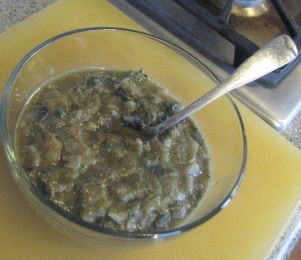What Not to Do When Cooking
Opportunities for humility are never in short supply. In a recent class, a participant brought up the perennial problem of cooking failures. My response began with the reassurance that cooking disasters don’t really happen that often, so don’t let them scare you from the kitchen. Of course the very next day I enjoyed a full-scale cooking disaster–and got a good reminder of how de-motivating failure can be.

My vegetable soup started out the right way: Making a broth with chicken bones, then using it to cook some leftover broccoli stalks which got pureed in the blender. But then I decided to throw in a handful of rice to see how it cooks up in a lots of liquid instead of a carefully measured amount. Next came some of last autumn’s kale from the freezer. Things were looking very green, so I sautéed and added some onion and then a few marinated sun-dried tomatoes. Finally, worried that the flavor was on the bland side, I dumped in Herbes de Provence.
For once, I had to force myself to eat the resulting conglomeration. Despite integrating a little color, it was still an unappetizing shade of green. The taste was completely uneventful. Plus, the rice didn’t have time to cook through so it was raw-tasting. And then there was the far more serious crunch of chicken bones. Seems I did a halfway job straining my chicken broth and a few got into the blender (which explained the funny noise the blender had been making!) No surprise that I yearned for something more after forcing my way through a bowl of my Ugly Soup. Needless to say, the recipe doesn’t follow.
So even after 40 years in the kitchen, disasters still happen. But as they say in the positive thinking business, mistakes are less important than the response. After a disaster, do you retreat into the welcoming arms of the processed foods industry (which thrives on making us feel incapable of feeding ourselves)? Or do you filter out the chicken bones and try again?
If you are interested in transitioning to a healthy eating lifestyle, the second option is the only option. The reason is simple: We cannot maintain a healthy eating lifestyle without cooking our own meals from real foods. A diet of packaged and processed foods cannot yield good health unless chosen with extreme care and eaten with extreme discipline–something that is practically unattainable.
Given that disasters cannot excuse us from the kitchen, what can we learn to help us get back in the saddle again?
- For starters, always strain your chicken broth.
- Avoid the last minute approach. Dashing flavors together in a hurry may be something TV chefs can do, but most of us benefit from a little time for deliberation. Or stick with a recipe created by someone who took time to figure out good flavorings.
- Instead, think ahead. The think-ahead approach always delivers the best results–and takes the stress out of cooking. Had I thought ahead, I would have cooked the rice the night before when there was plenty of time for it to soften into a nice, fluffy thickener.
- Herbs and spices, in particular, benefit from forethought. Dumping spices into a dish at the very end stunts their flavor potential miserably.
- Mind the colors in a dish We really do eat with our eyes as well as our stomachs. So even though I was full after eating my soup, my eyes were still hungry–and they are very close to the brain that sends me foraging for more food!
- Finally: Join one of our cooking classes! We love to share all the confidence-building tricks and tips, new recipes, new flavors and cooking basics that take the overwhelm out of healthful, everyday meal preparation. See how simple, easy cooking can be fun and engaging. Check out our schedule.